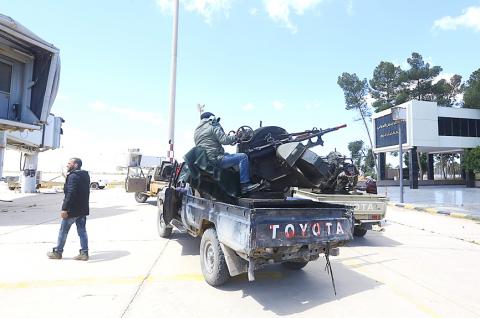Deaths and displacements yesterday mounted in splintered Libya as eastern forces sought to push into the capital, Tripoli, disregarding global appeals for a truce in the latest of a cycle of warfare since former Libyan leader Muammar Qaddafi’s fall in 2011.
The fighting threatens to disrupt oil supplies, fuel migration to Europe and wreck UN plans for an election to end rivalries between parallel administrations in east and west.
The eastern Libyan National Army (LNA) forces of Khalifa Haftar — a former general in Qaddafi’s army — said 19 of its soldiers had died in the past few days as they closed in on the internationally recognized government in Tripoli.

Photo: AFP
A spokesman for the Tripoli-based Ministry of Health said fighting in the south of the capital had killed at least 25 people, including fighters and civilians, and wounded 80.
The UN said 2,800 people had been displaced by clashes and many more could flee, though some were trapped.
“The United Nations continues to call for a temporary humanitarian truce to allow for the provision of emergency services and the voluntary passage of civilians, including those wounded, from areas of conflict,” it said in a statement.
Haftar’s LNA, which backs the eastern administration in Benghazi, took the oil-rich south of Libya earlier this year before advancing fast through largely unpopulated desert regions toward the capital, but seizing Tripoli is a much bigger challenge.
It has conducted airstrikes on the south of the city as it seeks to advance along a road toward the center from a disused former international airport.
However, the government of Libyan Prime Minister Fayez al-Serraj, 59, is seeking to block the LNA with the help of allied armed groups who have rushed to Tripoli from nearby Misrata port in pickup trucks fitted with machine guns.
A correspondent in the city center could hear gunfire in the distance southward.
Serraj has run Tripoli since 2016 as part of an UN-brokered deal boycotted by Haftar. His Tripoli government has reported 11 deaths in the past few days, without saying on which side.
UN envoy Ghassan Salame yesterday met Serraj in his office in Tripoli to discuss “this critical and difficult juncture,” the UN’s Libya mission said.
The violence has jeopardized a UN plan for a conference on Sunday and Monday to plan elections and end anarchy that has prevailed since the Western-backed toppling of Qaddafi eight years ago.
The UN High Commissioner for Refugees expressed anxiety about thousands caught in cross-fire and detention centers in conflict zones in a “rapidly deteriorating humanitarian situation.”

The US government has signed defense cooperation agreements with Japan and the Philippines to boost the deterrence capabilities of countries in the first island chain, a report by the National Security Bureau (NSB) showed. The main countries on the first island chain include the two nations and Taiwan. The bureau is to present the report at a meeting of the legislature’s Foreign Affairs and National Defense Committee tomorrow. The US military has deployed Typhon missile systems to Japan’s Yamaguchi Prefecture and Zambales province in the Philippines during their joint military exercises. It has also installed NMESIS anti-ship systems in Japan’s Okinawa

‘WIN-WIN’: The Philippines, and central and eastern European countries are important potential drone cooperation partners, Minister of Foreign Affairs Lin Chia-lung said Minister of Foreign Affairs Lin Chia-lung (林佳龍) in an interview published yesterday confirmed that there are joint ventures between Taiwan and Poland in the drone industry. Lin made the remark in an exclusive interview with the Chinese-language Liberty Times (the Taipei Times’ sister paper). The government-backed Taiwan Excellence Drone International Business Opportunities Alliance and the Polish Chamber of Unmanned Systems on Wednesday last week signed a memorandum of understanding in Poland to develop a “non-China” supply chain for drones and work together on key technologies. Asked if Taiwan prioritized Poland among central and eastern European countries in drone collaboration, Lin

NO CONFIDENCE MOTION? The premier said that being toppled by the legislature for defending the Constitution would be a democratic badge of honor for him Premier Cho Jung-tai (卓榮泰) yesterday announced that the Cabinet would not countersign the amendments to the local revenue-sharing law passed by the Legislative Yuan last month. Cho said the decision not to countersign the amendments to the Act Governing the Allocation of Government Revenues and Expenditures (財政收支劃分法) was made in accordance with the Constitution. “The decision aims to safeguard our Constitution,” he said. The Constitution stipulates the president shall, in accordance with law, promulgate laws and issue mandates with the countersignature of the head of the Executive Yuan, or with the countersignatures of both the head of the Executive Yuan and ministers or

CABINET APPROVAL: People seeking assisted reproduction must be assessed to determine whether they would be adequate parents, the planned changes say Proposed amendments to the Assisted Reproduction Act (人工生殖法) advanced yesterday by the Executive Yuan would grant married lesbian couples and single women access to legal assisted reproductive services. The proposed revisions are “based on the fundamental principle of respecting women’s reproductive autonomy,” Cabinet spokesperson Michelle Lee (李慧芝) quoted Vice Premier Cheng Li-chiun (鄭麗君), who presided over a Cabinet meeting earlier yesterday, as saying at the briefing. The draft amendment would be submitted to the legislature for review. The Ministry of Health and Welfare, which proposed the amendments, said that experts on children’s rights, gender equality, law and medicine attended cross-disciplinary meetings, adding that